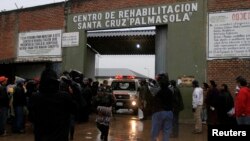Guards only secure the perimeter of Palmasola, Bolivia's most notorious prison. Inside each unit, murderers, drug traffickers and rapists make the rules and run a lucrative criminal economy.
Money can buy inmates everything: a cell, a shower, drugs, protection, prostitutes and prime "real estate" as large as two-story houses, from which to run a business or simply live relatively well.
On Friday, Pope Francis will enter the sprawling maximum-security complex in Bolivia's largest city, Santa Cruz, continuing his practice of visiting prisons when he was Archbishop of Buenos Aires.
"We make sure things are quiet around here," said Leonardo Medina, facing murder charges, one cheek bulging with coca leaves. Sporting a red jacket emblazoned with the word "discipline," Medina, 48, belongs to a team of security officers selected by inmates.
Palmasola is infamous for violence between rival factions. In one of the worst incidents in 2013, at least 30 inmates were killed and dozens wounded in a turf war that spiraled out of control in the prison's PC3 section, which houses the most violent.
Medina, housed in the quieter PC4 section that Francis will visit, said he was under instructions not to reveal the jail's dark underbelly to visitors.
"If we do something wrong you can go, but for us it's ugly. We have to stay behind and pay the price," he said, speaking in a fluent English learned while trafficking cocaine in the United States.
PC4 is more small town than prison wing. Laundry hangs from lines slung between ramshackle buildings, kiosks sell juices and tables from a cafeteria spill out into a square with a statue of Jesus Christ. The unit has alleys that lead from the muddy football field in the center, and inmates elect their leader, like a mayor.
Young children live inside the jail with their incarcerated parents alongside the most dangerous prisoners who can avoid the worst-offender unit with a bribe to officials, said Ramiro Llanos, a former head of Bolivia's prison services.
And like Medina, many of Palmasola's inmates have not been convicted of any crime. Nationwide, nearly 90 percent of Bolivia's 12,000 prisoners are awaiting trial, trapped by the country's gridlocked justice system.
Lined up outside the facility, Irene Pinto, 36 said her elderly mother had been locked up for failing to pay her debts. She said her mother has diabetes and with not enough medicine in the prison, she brought it in from outside.
"She sleeps in a room with four people, drug traffickers and murderers. So she worries and can't sleep easily," Pinto said.
The national prison director and the government declined to comment for this story.
Entrenched corruption
When Medina is not on security detail he makes leather wallets and hammocks that can fetch up to 450 Bolivianos ($66).
Without money, it is a punishing existence inside Palmasola. Roberth Aquino, 38, said a friend locked up on charges of land theft had paid about 6,850 Bolivianos for a bed, 1,300 Bolivianos for access to outdoor areas and 25 Bolivianos to use the showers.
Those without cash sleep on the floor. Those with wads of pesos swiftly climb a hierarchy in the prisoner ranks. Prisoners with money get more respect and protection.
"The government just locks you up inside and leaves you here," said Enea Cardina, a 61-year-old Italian citizen accused of murder.
The Catholic Church runs primary and secondary education schools, while a sign outside the prison chapel offers Alcoholics Anonymous meetings. It even offers prisoners university-level law classes.
"Human rights are widely violated in prisons," said Zaida Romero, who provides legal counseling inside Palmasola on behalf of the church. "A large percentage are here without trial."
Corruption is so entrenched in Bolivia's prison system that prisoners and families complain they have to bribe officials just to get a trial hearing, in addition to lawyers fees.
In the visitors line, Pinto said she had already put down 800 Bolivianos for her mother's two hearings and knew of another inmate still in prison on drugs charges because she lacked the money for a trial.
"She went in pregnant and now she has an eight-year-old child with her," Pinto said.
Ahead of the pope's arrival, prisoners were laying a stone pathway along a muddy throughway, clearing huge piles of litter and building walls.
Even among Bolivia's most hardened criminals, inmates say the pope will be safe.
"His visit is a benediction for us," said Ambi Vaca, 24, who is serving a 15-year sentence. "So we will look after him."
($1 = 6.85 Bolivianos)





